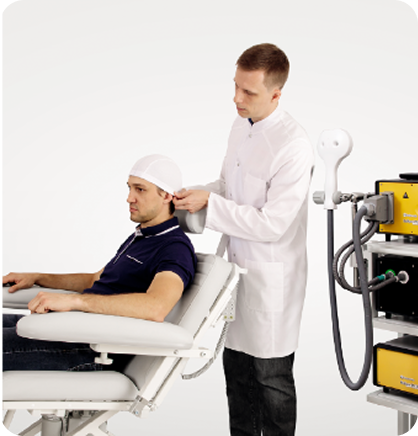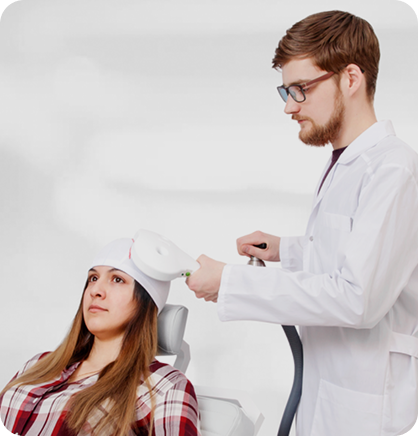rTMS Treatment in Norwest and Carlingford

MRI-Guided TMS therapy is now available at Mind Connections Specialist Health
Mind Connections Specialist Health Services Psychiatrists are at the forefront of non-medication treatment and neuroscience research. Both premises, Carlingford and Norwest, offer MRI-guided Transcranial Magnetic Stimulation (TMS) therapy. This ground-breaking approach signifies a major advancement in precision, personalization, and diagnostic capabilities, providing new hope and improved outcomes for patients who do not wish to have medication or if they are having difficulties with side effects.
Elevating our commitment to providing the most advanced treatment options, Mind Connections Specialist Health Services utilisescintermittent theta-burst stimulation (iTBS) for rTMS therapy. iTBS is a form of rTMS that delivers treatment in optimised intensities andcshorter intervals, significantly improving therapeutic outcomes compared to traditional r TMS protocols. This advanced technique allows for a more efficient and effective treatment process by reducing the duration of sessions while maximising therapeutic outcomes, namely recovery and well-being.
“rTMS was a game-changer for me. Medication was no help. I was desperate, angry, frustrated; too… depressed about everything. I was sceptical about rTMS, but I thought that I had nothing to lose. I am so glad I had it. It worked! No side effects.
I wish I had it earlier.”


One of the most appealing aspects of rTMS is its non-invasive nature. Treatments can be safely administered in an office setting without the need for anesthesia or sedation. This accessibility significantly improves the quality of life for patients, enhancing their productivity and providing an opportunity for some to wean off long-term medications.
“I was so depressed, I refused to fly interstate to see my grandchild. Nothing made me happy. My husband said rTMS is a miracle. I improved everyday, and I felt like myself again by the end. The greatest gift was visiting my grandson. My family is so surprised and happy. I am back.”
Repetitive Transcranial Magnetic Stimulation (rTMS) represents a significant advancement in treating psychiatric and neurological conditions. Its application across a wide range of disorders showcases its versatility and efficacy as a non-invasive neuromodulation technique. These psychiatric and neurological conditions include, but not limited to:
- Major Depressive Disorder (MDD)
- Obsessive-Compulsive Disorder (OCD)
- Post-Traumatic Stress Disorder (PTSD)
- Auditory Hallucinations in Schizophrenia
- Addiction Disorders
“I couldn’t work. I had migraines, tummy aches and what not! I saw that many specialists. Finally, I saw the Psychiatrist. rTMS was a breakthrough. No this and that test! The RESULTS were incredible. I am back at work. I don’t have to see specialists anymore!”
Furthermore, rTMS shows promise in treating neurological conditions such as:
- Early to moderate stages of Alzheimer’s Dementia
- Parkinson’s Disease, particularly when freezing becomes an issue
- Stroke rehabilitation
- Multiple Sclerosis
Additionally, research into r TMS has suggested potential benefits in improving sleep quality by triggering slow sleep waves, helping patients achieve a better night’s rest.
FAQS
rTMS uses an electromagnetic coil positioned on the side of the patient’s head. The magnetic field created stimulates the electrical impulses generated by the nerve cells (neurones).
In the case of Depression, the biological basis suggests that under-active regions of the brain responsible for regulating emotions have a significant role in the aetiology of Depression. By stimulating the prefrontal cortex with rTMS, the positive mood circuits within the limbic system, the brain’s emotional centre, are activated and this promotes recovery from depressive disorder and other psychiatric conditions. Repeatedly stimulating the nerve cells helps the frontal areas of the brain (responsible for thinking and impulse control) to regulate the deeper, emotional areas of the brain. This has an anti-depressant effect.
rTMS is suitable for patients who are adequately informed about the procedure and have consented to therapy. This is particularly relevant for individuals who have not experienced symptom improvement with previous treatment methods, such as various medications and psychiatric treatments.
Before the initial session, a psychiatrist with experience in rTMS conducts a comprehensive mental examination of each patient.
The procedure is administered by either a TMS technician or an accredited TMS psychiatrist during the therapy sessions. Since it is an outpatient procedure, it occurs in the office setting.
Before therapy can commence, your Psychiatrist must determine the optimal coil positioning on your head and the appropriate amount of magnetic energy for your treatment. Your initial mapping session typically lasts about 20-30 minutes.
A credentialed and trained technician with a mental health background performs the procedures for all follow-up treatments.
Here’s what you can expect during TMS:
- You will sit in a comfortable chair. You won’t need general anaesthesia. You are not under sedation, and you’ll be awake throughout the treatment.
- If it’s your first session, your technician will take many measurements of your head to determine where to place the magnetic coil. The measurements optimise the therapy sessions with personalised settings on the TMS machine.
- Your technician will have you wear earplugs to minimise the clicking sound of magnetic impulses.
- Your technician will place the coil above the front area of your scalp. Next, they’ll start the treatment.
- You’ll hear a clicking sound as the magnetic impulses are released. You’ll also feel a gentle tapping sensation beneath the magnetic coil.
- The treatment can last from 3 minutes to 20 minutes. You can drive yourself home after the procedure and resume normal activities.
You’ll need to repeat the procedure 3 – 5 days a week for about 4 to 6 weeks. The exact length of your treatment depends on your response and specific condition.
Some patients may experience a headache following rTMS, typically relieved by taking two Panadol pills. Other common side effects include discomfort on the scalp at the location of stimulation, facial muscular tingling, and mild twitching around the eyes and/or facial muscles. However, these side effects are usually temporary and diminish throughout therapy.
Since treatment typically involves sessions five days a week for multiple weeks, you may need to miss a few hours of work each day. The duration will depend on your schedule, travel time, and appointment timing.
Each TMS session can vary in duration, up to 20 – 30 minutes.
You can request a medical certificate to attend your treatment sessions if needed.
If your treatment is covered by WorkCover or third-party insurance, your treating Psychiatrist can recommend leave for you for the duration of the treatment.
Compared to conventional antidepressants, which typically take six weeks or more to show effects, most patients report positive mood changes with rTMS as early as the first week of treatment.
The results vary from patient to patient. Some patients’ remission may last a year or longer, and some may receive maintenance therapy sessions.
Most patients may experience complete remission after 35 sessions. The results vary from patient to patient. And some may require maintenance therapy sessions.
Maintenance rTMS therapy is an effective and safe treatment for preventing depressive relapse/recurrence.
Your treating Psychiatrist will guide you regarding the maintenance of rTMS therapy. Although it may vary from person to person, a commonly used protocol is once a week for the first six months and once biweekly for the second six months.
Your personality becomes well-adjusted to face day-to-day challenges.
When experiencing positive emotions, individuals often revert to their typical personality traits. Generally, when patients are content with their emotional state, they tend to function better overall.
rTMS does not cause memory impairment. Patients’ ability to think improves simultaneously with improved role functioning.
You are free to leave after the rTMS session. You can drive and return to work following the treatment.
